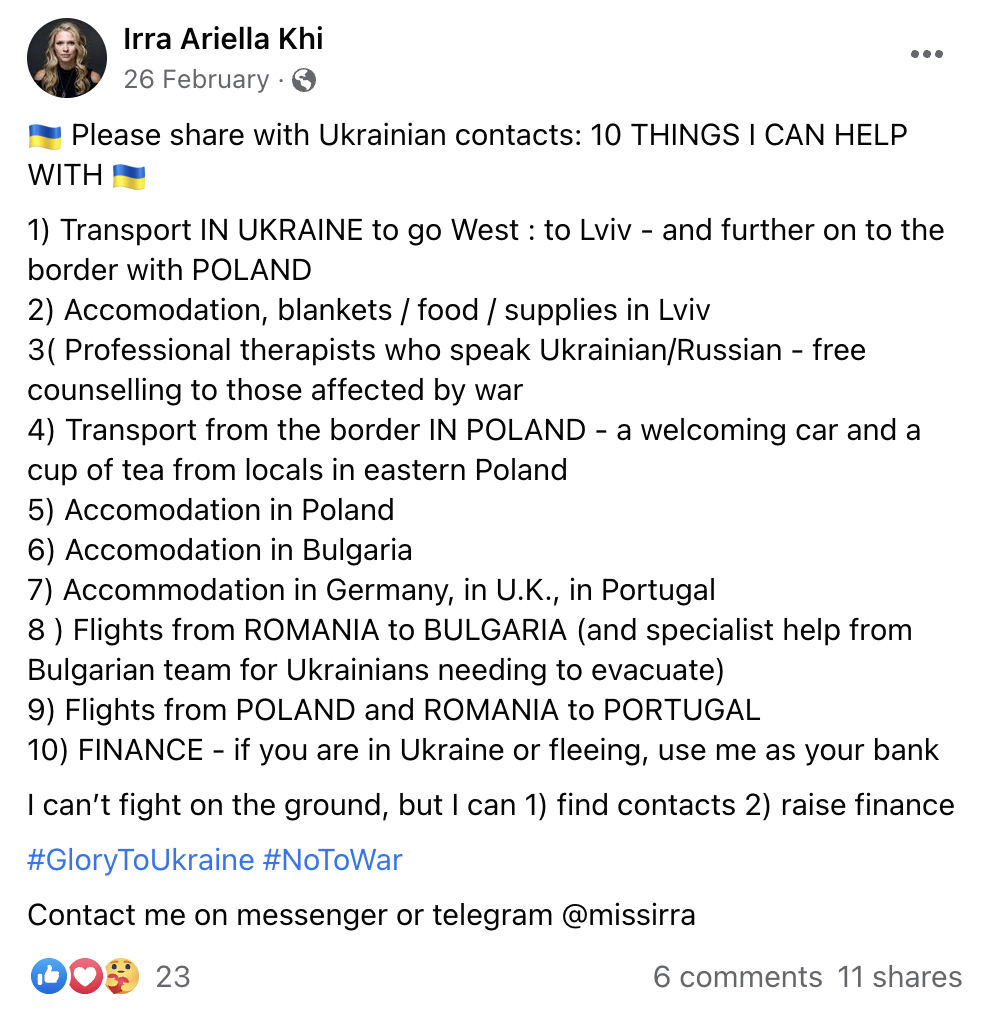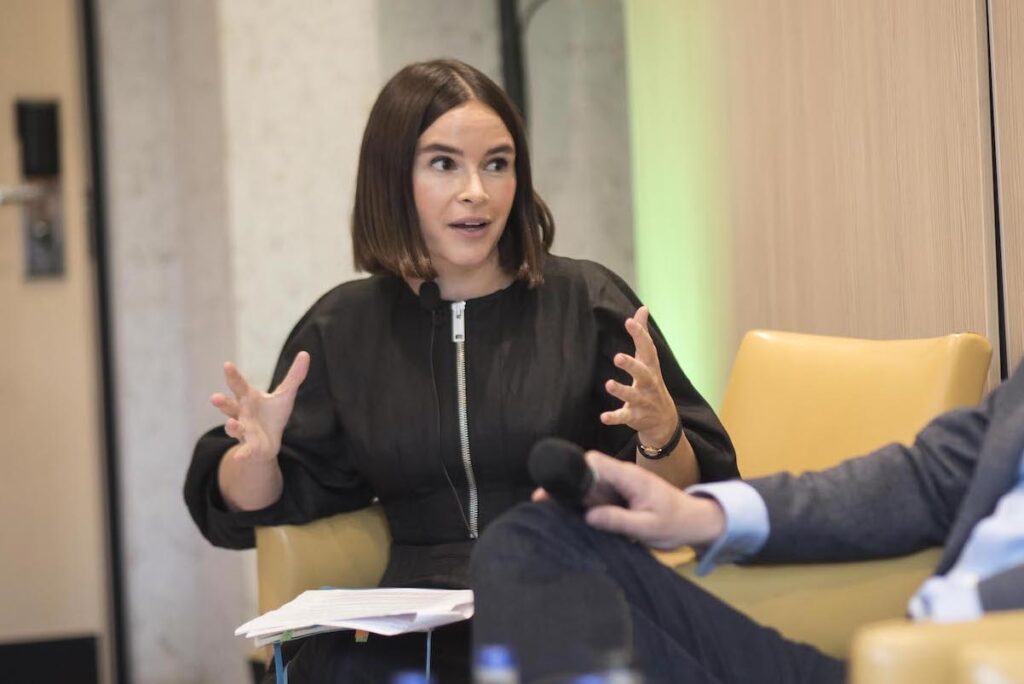Irra Ariella Khi started Sunflower Relief to support her fellow citizens in Ukraine. She explains how she used her experience launching a tech startup to build a needs-first humanitarian aid network from scratch.
It can cost up to £4,000 for a ticket out of Ukraine. From the active warzone in the East, drivers are charging a high price for the four-day trip to the western border. Even those who can afford it still can’t, or don’t want to, leave. Many are elderly, unwell, or fear leaving their families behind.
Irra Ariella Khi started Sunflower Relief to support the most vulnerable people in Ukraine who can’t access foreign borders or foreign aid.
The grassroots not-for-profit network matches donors to local NGOs so 100% of their funds go to specific cases – like sourcing ultrasound equipment for Odessa Children’s Clinic or raising funding to support HIV, TB, and Hepatitis C patients in Kyiv and Kharkiv.
Sunflower Relief has dedicated 100,000+ volunteer hours, matched £2.25m in donations to verified NGOs in Ukraine, and helped 250,000+ civilians impacted by the war since its inception.
At Founders Forum London 2022, Irra helped coordinate President Zelenskyy’s holographic address to Europe’s tech community and over $1m was pledged in support of Sunflower’s aid work.
Still, as temperatures plummet, war rages in the East. Irra is now fundraising for Sunflower Relief’s Winter Campaign, with a target of £500k, to get basic supplies to people in Eastern Ukraine.
Just £20 can support a family of three with food and hygiene products for a week in Ukraine. £300 can support the same family for the duration of the winter.
If you’re able to help, click here to donate and support Sunflower’s aid work. You can also get in touch with Irra at irra@zamna.com.
Starting Sunflower Relief
As a mother of four and the Founder and CEO of UK-based travel identity startup, Zamna, Irra is used to juggling multiple hats. After war broke out, she spent 48 hours on the phone to her family and friends back home.
From her conversations, Irra found that people were mostly looking for 10 things that she was able to provide. She encouraged her contacts to use her as their personal bank.

“At the start, I was maxing out my own credit cards and getting loans to help those I could!” Irra recalls. “Eventually, I realised that I had the network and ability to attract funding for aid, as long as it was going to a trusted and verified receiver.”
Irra joined forces with Zamna board members, Saul Klein and Remus Brett, from London-based VC, LocalGlobe, who provided funding for Sunflower through Phoenix Court Works to help her scale a team and operationalise her humanitarian relief effort.
She launched Sunflower Relief four days after Russia’s invasion, on 28 February. Within a month, she had raised £150k, diverted a cargo plane to deliver supplies to Ukraine, and partnered with five verified Ukrainian NGOs.
Without the proper distribution networks, well-intentioned aid often goes to waste. Irra set out to flip the model for humanitarian aid by focusing on the end recipients first and working backwards, building a network of volunteers and NGOs in Ukraine to get supplies and funding to those in need.
“Before the war, there was no infrastructure for humanitarian aid in Ukraine because people didn’t need it, so the bigger players like the Red Cross and UNICEF took some time to get on the ground,” Irra explains.
“With our network of volunteers, operating in three local languages, we realised that we could move faster early on in the war – that was the aha moment!
“The more we got the micro-logistics right – finding out what recipients needed first, matching that with available aid, and getting proof that the aid got where it was intended – the more impact we had.”

On the Ground In Ukraine
Sunflower Relief started in sprint mode, an emergency-first response to the war, helping people displaced across the country with basic supplies.
Now, the organisation has entered its phase two, marathon mode; a more localised response focused on people trapped in the Eastern warzone. Its phase three, Irra hopes, will be post-war developmental aid.
For Irra, the next months are crucial. In late October, Russian missile strikes left 1.5 million households in Ukraine without electricity. Almost a third of the country’s energy infrastructure has been damaged or destroyed.
The Sunflower team faces a daily flood of requests from local NGOs for food, clothes, medical supplies and basics like heaters and candles.
“Winter is going to make or break the lives of the hundreds of thousands of people we’re supporting through our network,” Irra says.
“People need to know that we are part of the resistance. We help vulnerable citizens living on the front line stay alive and well, so that their relatives who would normally provide for them can keep on fighting.”

Lessons For Startup Founders
There are more than a few strands of tech startup DNA within Irra’s humanitarian aid initiative – Sunflower’s founding partners include Samir Desai, Founder of Funding Circle, and a host of top investors and serial entrepreneurs.
Sunflower’s operational side – the website, software subscriptions, and salaried staff – is funded by VCs with a separate pot of ops funding, so that 100% of aid raised goes to Ukrainians in need.
Irra’s approach to being the CEO of two very different organisations is simple: hire the best people, give them the resources they need, and establish processes that enable them to do their jobs effectively.
“If you’re doing everything yourself, then you’re not an effective leader,” she says.
“You can’t be the bottleneck in decision making; you have to be humble and realise you don’t have all the answers. Get people around the table who know better than you.”
Irra is able to quickly switch focus between Sunflower and Zamna, coming in when she’s needed to make strategic decisions, respond to critical issues, and solve internal debates. Her ultimate goal for Sunflower Relief is that, one day, it won’t have to exist.
Planning for the future is difficult in any industry; for an organisation responding to the humanitarian crisis in Ukraine, it’s almost impossible.
Irra’s focus is on the present. “Until this war stops,” she says, “we won’t stop either.”
Click here to find out how you can support Sunflower’s aid work or get in touch with Irra at irra@zamna.com.
Subscribe to Founders News to get more startup stories like this one direct to your inbox.
 All Posts
All Posts


